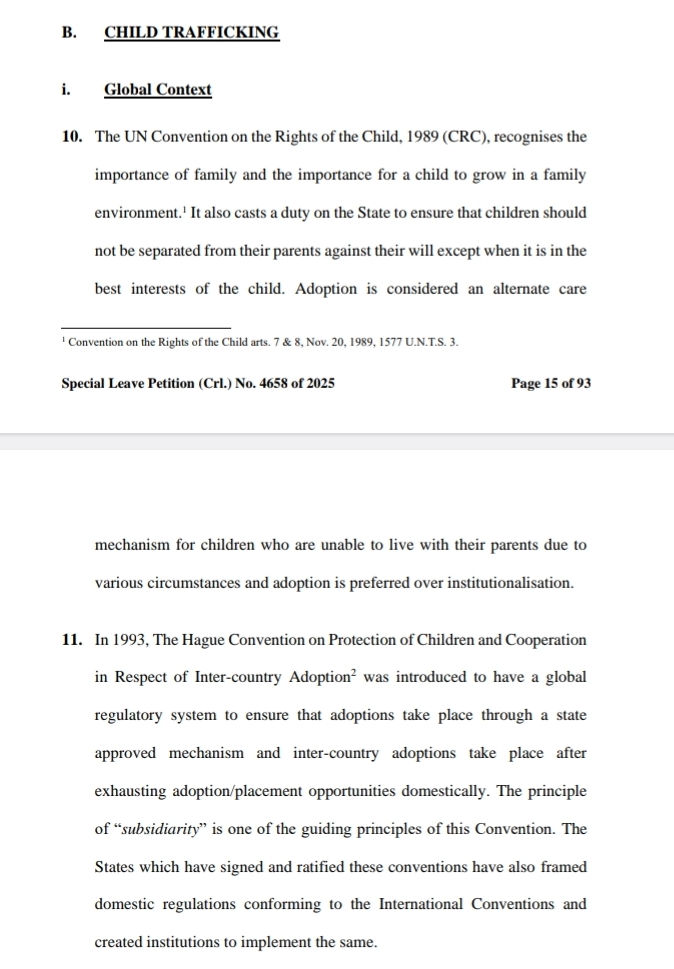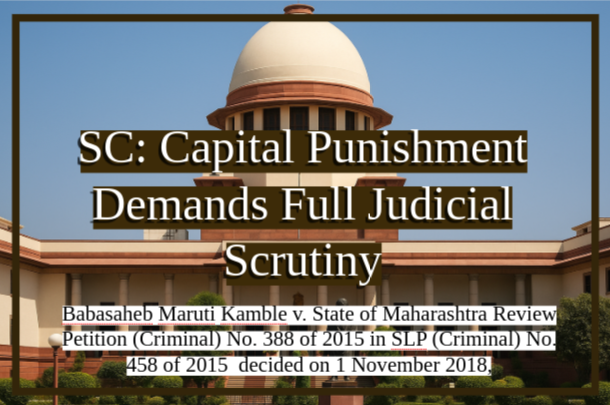SC Takes a Stern Stand Against Child Trafficking: Cancels Bail for Accused, Orders Expedited Trials
- M.R Mishra

- Apr 17, 2025
- 4 min read
In a resounding affirmation of the State’s duty to protect its most vulnerable citizens, the Supreme Court of India on April 15, 2025, delivered a judgment that pierces the veil of procedural laxity and strikes at the heart of child trafficking. Setting aside bail orders issued by the Allahabad High Court in favor of 13 accused persons involved in a sprawling interstate child trafficking racket, the apex court underscored the gravity of the offence, the trauma inflicted on families, and the necessity of swift, unrelenting justice. It was not merely a procedural correction it was a moral reckoning.
What's The Matter?
The case arises from three FIRs registered across Uttar Pradesh, revealing a well-organized syndicate spanning multiple states including Jharkhand, Rajasthan, and West Bengal. Children from poor households were kidnapped and sold for adoption in illicit transactions ranging from ₹40,000 to ₹10 lakh. The network’s operations were both clinical and cruel, exploiting the desperation of childless couples while commodifying human life.

Among the central accused was a nurse, Anuradha Devi, who allegedly used her medical credentials as cover to orchestrate the trafficking. Others, like Manish Jain and Jagveer Baranwal, served as logistical linchpins, coordinating cross-state movements. One accused, Santosh Sao, candidly admitted to buying a trafficked child for ₹4 lakh, invoking a twisted rationale of wanting a son.
What Happened in Court?
The High Court’s reasoning for granting bail citing the accused’s absence from the FIR or parity with co-accused was found by the Supreme Court to be wholly inadequate. In a tone sharpened by disbelief, the Bench described such leniency as “callous,” especially when many accused had absconded after being released. The apex court emphasized that child trafficking is not an ordinary crime; it is a crime against humanity.
The consent of the child or parents is irrelevant when exploitation is the inevitable outcome. Justice Pardiwala, writing for the Bench, called it “modern-day slavery,” a scourge that degrades our collective conscience and tears at the social fabric.
Importantly, the judgment recalibrates the balance between individual liberty and public interest in bail jurisprudence.
The Court was categorical in stating that liberty, while fundamental, is not absolute. In offences of this nature, it must yield to the interest of society and the safety of children.
Citing precedents such as Gudikanti Narasimhulu v. Public Prosecutor and Prasanta Kumar Sarkar v. Ashis Chatterjee, the Court noted that bail orders cannot be granted in a mechanical fashion.
The seriousness of the charges, the potential for evidence tampering, and the antecedents of the accused are all factors that must weigh heavily against the grant of bail.
In a sweeping move that went beyond the immediate facts of the case, the Supreme Court issued time-bound directions to overhaul the investigation and trial process in child trafficking cases.
Trials are to be committed to sessions courts within two weeks and concluded within six months, a timeline to be achieved through day-to-day hearings.
The court ordered the appointment of Special Public Prosecutors, and directed states to act decisively against absconding accused. Hospitals complicit in trafficking were put on notice, with the threat of license suspension should it be proven that infants were trafficked from their premises.
The Court also took a progressive view of victim rehabilitation. Children recovered from trafficking networks are to be enrolled in schools under the Right to Education Act, and compensation is to be awarded under the Uttar Pradesh government’s Rani Laxmi Bai Mahila Evam Bal Samman Kosh.
Recognizing that trafficking is not just a law and order issue but a developmental failure, the Court mandated the implementation of the BIRD Report’s recommendations on strengthening Anti-Human Trafficking Units.
How Global Standards Shaped the Verdict on Child Trafficking
By invoking instruments like the UN Convention on the Rights of the Child (CRC), the Hague Convention on Inter-country Adoption, and the Palermo Protocol, the Court framed child trafficking as a grave violation of international law and a betrayal of India’s treaty obligations.

The CRC’s guarantee of a child’s right to identity and family life provided the moral and legal foundation for the Court’s observation that trafficking dismantles both. The subsidiarity principle from the Hague Convention was used to highlight how delays in legal adoption processes create a shadow market exploited by traffickers.

The Palermo Protocol’s broad definition of trafficking including illegal adoption and the irrelevance of consent strengthened the Court’s interpretation of Section 370 IPC to align with international norms.

The Court went further by referencing global case studies from China, Ukraine, and Guatemala countries that faced trafficking crises due to systemic failures and conflict. These examples served as a stark warning for India, which risks replicating these patterns unless preemptive reforms are undertaken.
The judgment also cited the 2016 UN Special Rapporteur Report, noting how demand-driven trafficking robs children and families of their futures.

India’s Constitution and laws, including Article 23 and the Juvenile Justice Act, already align with global standards. Yet the Court noted that enforcement lags behind intent.
To bridge this gap, it called for urgent reforms: faster adoption of pending international treaties, use of technology like DNA databases, and global cooperation to dismantle trafficking networks.
This ruling is more than a judicial pronouncement it is a moral declaration. It affirms that no child’s fate should be determined by poverty, and that the machinery of justice must move with purpose when innocence is at stake.
In the larger tapestry of constitutional justice, this judgment will be remembered not only for its doctrinal clarity but for its ethical resolve. As the nation watches to see whether the states comply with the directives, the message is unambiguous: trafficking networks will face the full weight of the law, and the courts will no longer tolerate impunity cloaked in process.







Comments